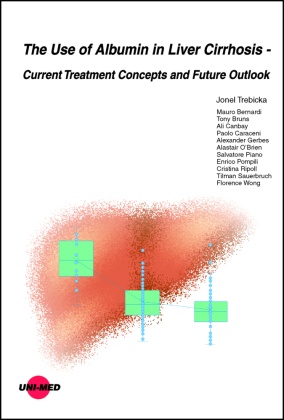The Use of Albumin in Liver Cirrhosis - Current Treatment Concepts and Future Outlook
| Verlag | Uni-Med |
| Auflage | 2024 |
| Seiten | 95 |
| Format | 17,6 x 24,6 x 0,9 cm |
| Gewicht | 324 g |
| Artikeltyp | Englisches Buch |
| Reihe | UNI-MED Science |
| ISBN-10 | 3837416674 |
| EAN | 9783837416671 |
| Bestell-Nr | 83741667A |
Albumin is one of the most used human products worldwide. It is produced in the liver and has multiple functions all over the body. Therefore, if the liver is diseased albumin synthesis and quality declines. It is intuitive to say that if there is a deficiency we can supply - however this is not as easy as it appears. Use of albumin in patients with liver disease has been studied over the last decades with recent studies widening our understanding of this drug. This book focuses on the use of abdomen and liver cirrhosis, the mechanisms and part of physiology behind it as well as the dos and don'ts of clinical practice and current guidelines. Worldwide experts of liver cirrhosis and use of albumin have contributed to the book and reflected the current recommendations.
Inhaltsverzeichnis:
1.Introduction122.The Pathogenesis and Clinical Course of Cirrhosis162.1.Liver fibrosis162.2.Portal hypertension172.3.Liver cirrhosis and decompensation172.4.Diagnostic options202.5.Treatment options213.Properties of Endogenous Albumin in Cirrhosis263.1.Human albumin - synthesis, metabolism, structure and properties263.1.1.Albumin synthesis and metabolism263.1.2.Albumin structure263.1.3.Albumin functions263.2.Pathomechanisms and complications in cirrhosis293.2.1.Portal hypertension293.2.2.Acute decompensation and acute-on-chronic liver failure303.3.Serum albumin abnormalities in cirrhosis313.3.1.Hypoalbuminemia313.3.2.Albumin structure and function abnormalities in cirrhosis313.3.3.Effective albumin concentration324.Treatment Concepts and Established Indications364.1.Historical overview of indications for human albumin in cirrhosis364.2.Albumin use after large-volume paracentesis364.2.1.Large volume paracentesis and post-paracentesis circulatory dysfunction364.2.2.Albumin use for the prevention of PPCD after LVP374.2.3.Is there a role for albumin in paracentesis of less than 5 liters?384.3.Albumin use in patients with spontaneous bacterial peritonitis384.3.1.Prognostic significance of bacterial infections in cirrhosis384.3.2.Pathophysiology and the clinical course of spontaneous bacterial peritonitis394.3.3.Albumin use for prevention of acute kidney injury in patients with spontaneous bacterial peritonitis394.3.4.Do all patients with spontaneous bacterial peritonitis require albumin?404.4.Albumin for the management of patients with cirrhosis and acute kidney injury404.4.1.Redefining acute kidney injury in cirrhosis404.4.2.Use of albumin in the diagnostic work-up of AKI424.4.3.Albumin in the treatment of HRS-AKI444.4.4.Adverse events associated with albumin use in patients with AKI445.New indications for albumin in patients with decompensated cirrhosis525.1.Acute or short-term albumin administration525.1.1.Bacterial infections unrelated to SBP535.1.2.Sepsis with hypotension545.1.3.Hepatic encephalopathy555.1.4.Hyponatremia565.1.5.Acute decompensation of cirrhosis requiring hospitalization575.1.6.Considerations for acute and short-term albumin treatment585.2.Long-term use of albumin for the management of ascites585.2.1.The ANSWER study585.2.2.The "refractory ascites" study605.2.3.The MACHT study605.2.4.The "filling the gap" hypothesis615.2.5.Real-word experience615.2.6.Considerations for long-term albumin treatment626.Role of Albumin Levels, Biomarkers and Treatment Monitoring666.1.Changes in quantity and quality of albumin in decompensated cirrhosis666.2.Treatment targets in acute and long-term settings676.2.1.Acute setting676.2.2.Long-term setting696.3.Future directions and conclusions707.The Caveats of Albumin Use in Cirrhosis747.1.Volume expanding effects of albumin and the risk of volume overload747.2.Volume expanding effects of albumin and the risk for variceal hemorrhage767.3.Albumin effects on coagulation787.4.Allergic reacti on to albumin787.5.Other possible side effects818.Mechanisms of Albumin868.1.Mechanisms of action of albumin and pathophysiologic considerations in cirrhosis868.2.Oncotic pressure868.3.Antioxidant and binding abilities878.4.Endothelial stabilization and coagulation878.5.Anti-inflammatory889.Future Directions929.1.Choose wisely929.2.Albumin levels and biomarkers for guidance929.3.Drugs bound to albumin939.4.Organization of services93Index94

